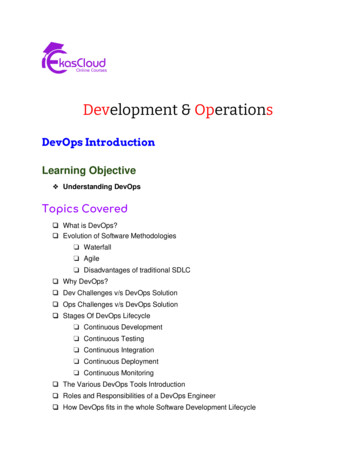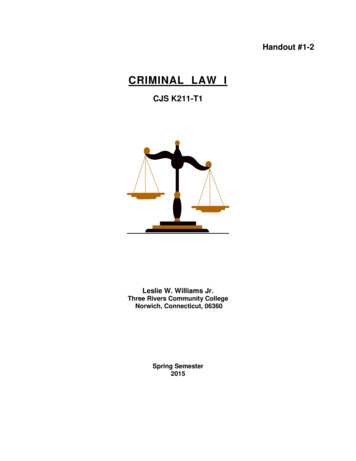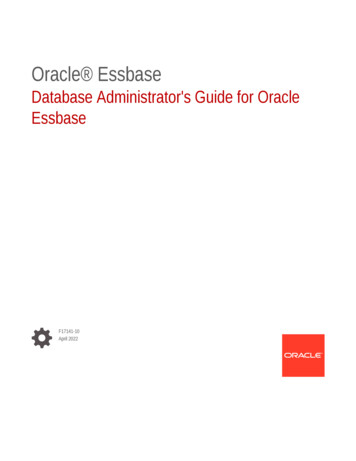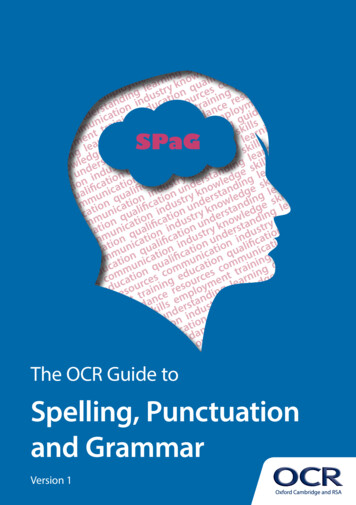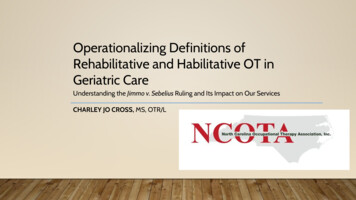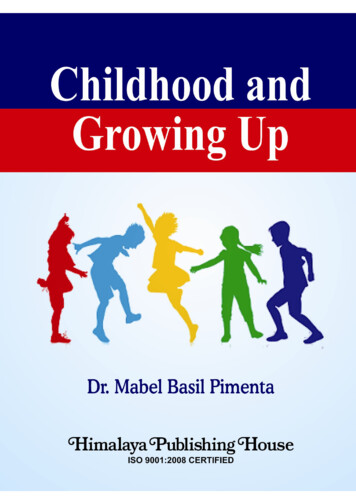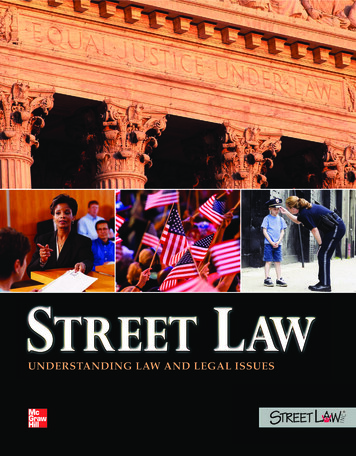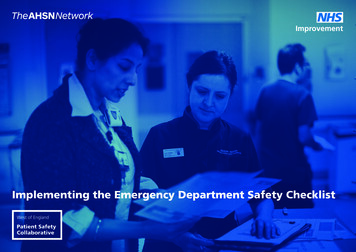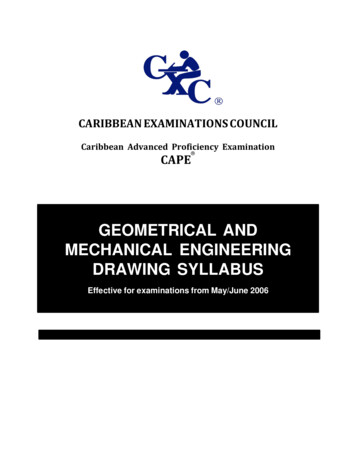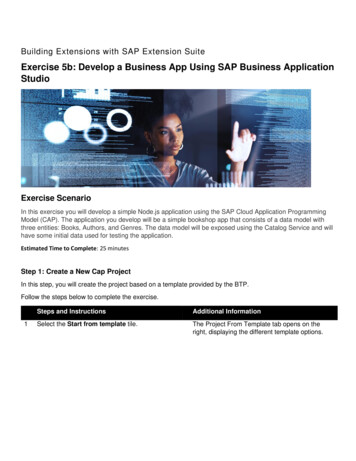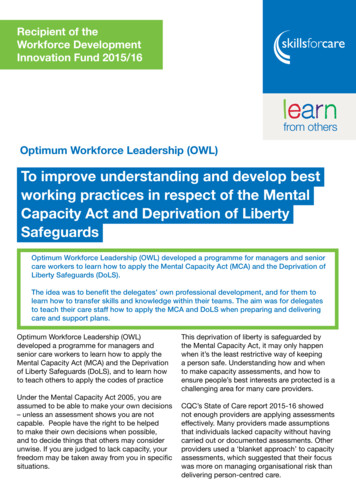
Transcription
Recipient of theWorkforce DevelopmentInnovation Fund 2015/16Optimum Workforce Leadership (OWL)To improve understanding and develop bestworking practices in respect of the MentalCapacity Act and Deprivation of LibertySafeguardsOptimum Workforce Leadership (OWL) developed a programme for managers and seniorcare workers to learn how to apply the Mental Capacity Act (MCA) and the Deprivation ofLiberty Safeguards (DoLS).The idea was to benefit the delegates’ own professional development, and for them tolearn how to transfer skills and knowledge within their teams. The aim was for delegatesto teach their care staff how to apply the MCA and DoLS when preparing and deliveringcare and support plans.Optimum Workforce Leadership (OWL)developed a programme for managers andsenior care workers to learn how to apply theMental Capacity Act (MCA) and the Deprivationof Liberty Safeguards (DoLS), and to learn howto teach others to apply the codes of practiceUnder the Mental Capacity Act 2005, you areassumed to be able to make your own decisions– unless an assessment shows you are notcapable. People have the right to be helpedto make their own decisions when possible,and to decide things that others may considerunwise. If you are judged to lack capacity, yourfreedom may be taken away from you in specificsituations.This deprivation of liberty is safeguarded bythe Mental Capacity Act, it may only happenwhen it’s the least restrictive way of keepinga person safe. Understanding how and whento make capacity assessments, and how toensure people’s best interests are protected is achallenging area for many care providers.CQC’s State of Care report 2015-16 showednot enough providers are applying assessmentseffectively. Many providers made assumptionsthat individuals lacked capacity without havingcarried out or documented assessments. Otherproviders used a ‘blanket approach’ to capacityassessments, which suggested that their focuswas more on managing organisational risk thandelivering person-centred care.
OWL was established as a workforce planningand development partnership organisation forowners and managers of health and social careorganisations across Nottinghamshire in March2014. We work with independent sector healthand social care providers who deliver carethrough residential settings, nursing homes,domiciliary care agencies, and supported livingorganisations for older people and youngeradults.The most popular learning event wecommissioned in 2014-15 was on the MentalCapacity Act (MCA). However it was felt thatthe one-day courses had not fully addressedthe learning needs. Local authority qualityaudits identified there was a lack of evidenceto show that appropriate processes were inplace to assess mental capacity, and alsothat Deprivation of Liberty Safeguards (DoLS)referrals were not being made appropriately.It was also noted as an area of concern inCare Quality Commission (CQC) reports bothnationally and locally.OWL wanted to develop a learning eventthat would deliver in-depth knowledge andunderstanding of the MCA, the code of practiceand DoLS. The overarching aim was that thiswould enable providers to make fundamentaland lasting changes to their ways of workingthat would contribute to an improvement in theprovision of personalised care for people whoneed care and support.What we wanted to achieveThe individual aims of the project were tosupport managers and senior staff members to: understand the MCA code of practice understand how to apply the code of practiceand relevant case law review and rewrite policy and procedures onMCA and DoLSs identify best practice through example formsand capacity assessments put the learning into practice with the supportof specialists learn how to teach others access on-line learning materials to supportthe MCA and DoLS.The idea was to benefit the delegates’ ownprofessional development, and for them to learnhow to transfer skills and knowledge within theirteams. The idea was for delegates to teach theircare staff how to apply the MCA and DoLS whenpreparing and delivering care and support plans.Our overall aim was to improve the quality of lifeand personalisation of service to people whoreceive care and support.What we didThe programme was open to all to apply. Itwas promoted as being especially useful fororganisations caring for younger adults intransition. Invitations were sent to encourageapplications from those care providers who wereidentified in the local authority quality auditsas requiring support to meet the standards.Applications were welcomed from residentialand nursing care providers and organisationsproviding supported living for both youngeradults and older people.All organisations who expressed an interestwere invited to a launch event where the mainrequirements of the subsidised programmewere set out. Attendance was a key factor,as well as committing to complete work inbetween sessions and completing evaluationreports as requested. Initially the course wasoversubscribed and participating organisationswere selected to ensure that as wide a range aspossible were included.The workshops really helpedme to understand the MCAand when we need to testcapacity. This helped us toreview our MCA and DoLSspolicy and put a new MCAbest interests assessment inplace.Rebecca Key, DeputyManager, Hatzfeld HouseWe accepted 12 organisations to participate inthe project, with a requirement that the followingtwo members of staff attend all sessions: a manager with a hands-on responsibility forthe quality of care and a senior support worker with passion for
championing residents’ rights and who leadson this area of work.The successful applicants were divided intotwo parallel groups of 12 participants (12organisations in total) for ten three-hour sessionsover a six-month period of time. The specialistfacilitators used a range of materials within thesesessions to teach delegates about the MentalCapacity Act (MCA) and Deprivation of LibertySafeguards (DoLS), and to share information andideas about how these two pieces of legislationcan and should be used in care home andsupported living settings.Learning methods included: PowerPoint presentations and relateddiscussion case studies ‘radio plays’ of relevant case law judgements quizzes participants’ formal feedback from Code ofPractice reading.Delegates contributed: anonymised materials includingcommunication aids, capacity assessments,best interests decisions, and DoLS requestsfor a Standard Authorisation from their caresettings to aid discussion and learning tasks that they completed away from thegroup sessions, including reading chapters1-6 and summaries of chapters 7, 9 and 10of the MCA 2005 Code of Practice andreading relevant sections of the Law Society’sguidance on identifying deprivations of liberty presentations on particular aspects of theMCA and DoLS at the final session.What we achievedThe course increased delegates’ knowledge andconfidence in using the MCA and DoLS in theircare settings. During the sessions the groupsworked to analyse and assess a range of mentalcapacity assessment forms. This provided themwith an opportunity to review their learning,critically assess what the forms should include,and the language they should use so staffunderstood how to complete them accurately.The groups were successful in creating onestandard template for use by all.The MCA project has beenexcellent. The depth ofknowledge and practicalinvolvement has made itsomething which has beenworthwhile both in knowledgebase and in applying itdirectly to the workplace.Ros Heath, Owner Manager,LandermeadsOptimum will share this with NottinghamshireCounty Council and suggest it is used as amodel template across the county. They alsobenefitted from the opportunity to establishsupportive links with other organisations, anda contact list was established to help themstay in touch. Some of the organisationsshared and adapted relevant paperwork toimprove their ways of working. After the finalsession, attendees were asked to complete anoverall evaluation of the project. Their positivefeedback on these forms regarding what theyfound helpful included completing capacityassessment templates and determining whatinformation was relevant, gaining knowledgeabout the best interests’ process, and learningabout deprivations of liberty.What we learntThe main challenge for the project was the shorttimescale. It was necessary to leave sufficienttime between each workshop for the assimilationof the learning to take place. The facilitatorsfaced a further challenge in the different levelsof knowledge the delegates had at the outset.Progress was slowed to accommodate thosewith less knowledge, but this had a knockon effect on what could be covered and howsoon in the project. It was the flexibility of thefacilitators and their ability to work across thelevels, making the necessary adjustments to theworkshops as they were happening that addedto the successful outcomes.OWL felt organisations did not make the bestuse of the learning tools provided for theassessment of the learning, nor the onlinelearning resources designed to assist with thedelegates’ knowledge transfer sessions within
their organisations. Despite the phone supportthat was made available to each of the caresettings, they were unsure how to access theonline tools. Had there been more time wewould have visited each of the organisations andworked through it with them in person.If this project were to run again, ourrecommendations would be:1. The project should run over ten to 12 months.2. There should be at least 12 workshops.3. Strong emphasis should be placed on therole of the whole workforce in relation tothe implementation of MCA and DoLS in theworkplace.4. Organisations should receive more guidanceon who should be released to attend toensure the right people are on the course.5. A pre-assessment workbook should be arequirement so that the initial level ofknowledge and understanding can beidentified.6. Each of the participating organisations shouldhave a visit to ensure they are signpostedto all supporting resources, they know howto access all the learning tools provided andunderstand how they should be used for theirown benefit and for evaluation purposes.7. Terms and conditions will be reviewed toinclude financial penalties for non-attendanceand non-completion of work required by theproject, including evaluations.This project addressed the 2015/16 priority on:Projects which identify what learning and development is required to ensure that thosecarrying out care needs assessments take an asset (rather than a deficit) approach,thereby focussing on the skills and abilities of the person who needs support. Projectsshould align with the Care Act 2014 requirement that local authorities consider theperson’s own strengths and capabilities, and support available from their wider supportnetwork or within the community when making assessment of care and support needs.
For more information please visitwww.nottinghamshire.gov.uk/owlProject lead: Claire Poole, Project Team Manager, Optimum WorkforceLeadership, Nottinghamshire County CouncilClaire.Poole@nottscc.gov.ukSkills for Care recommendsSkills for Care produces a wide range of products and services related to learning and developmentand practical tools for employers, including those related to the Mental Capacity Act 2005.Mental Capacity Act2005Learning andDevelopmentTopicsOur Finding and Keepingworkers online resourcegroups resources to helpemployers recruit and retainthe right staff.From initial induction throughto continuing professionaldevelopment, this sectionhelps understand what forcare.org.uk/learningThe topics section of the Skillsfor Care website includespractical tools and guidanceon a wide range of subjects,including autism, dementia,end of life care, kills for CareWest Gate6 Grace StreetLeedsLS1 2RPtelephone 0113 245 1716email info@skillsforcare.org.ukweb www.skillsforcare.org.uk Skills for Care are
To improve understanding and develop best working practices in respect of the Mental Capacity Act and Deprivation of Liberty Safeguards Optimum Workforce Leadership (OWL) developed a programme for managers and senior care workers to learn how to apply the Mental Capacity Act (MCA) and the Deprivation of Liberty Safeguards (DoLS). The idea was to benefit the delegates' own professional .
